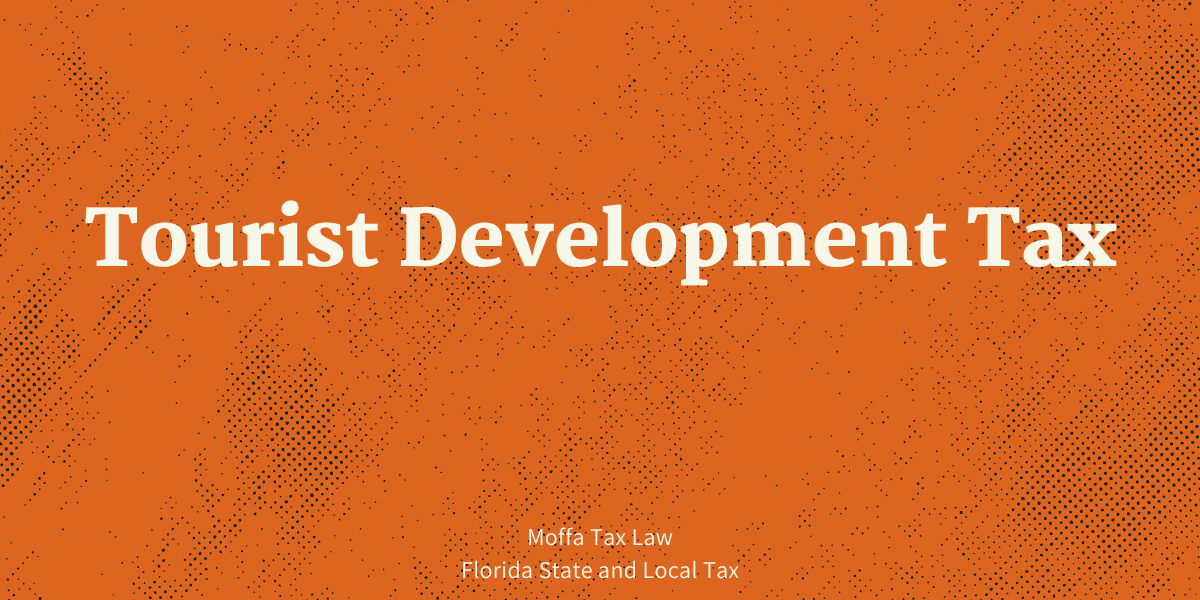NEWS & INSIGHTS


Florida Tourist Development Tax (TDT): Complete Guide for Hosts, Landlords, and Tourism Operators
Florida law allows counties to impose local-option taxes on short-term accommodations to fund tourism-related activities. If you rent out any property for less than six months, you need to understand Florida’s Tourist Development Tax (TDT) system — including its many variations and legal nuances.
What Is the Tourist Development Tax?
The Tourist Development Tax (TDT) is a county-level tax imposed on transient rentals of 6 months or less in:
- Hotels and motels
- Apartments and condos
- Mobile home and RV parks
- Rooming houses and timeshares
The base rate starts at 1% or 2%, but depending on the county’s eligibility and statutes adopted, the rate may increase up to 6% in layered increments.
Legal Basis: § 125.0104, Fla. Stat.
How the Tourist Development Tax Is Structured
Florida’s TDT can be imposed in layers, depending on a county’s history and use of funds:
🧱 1% or 2% Base Tax
Counties may initially adopt a 1% or 2% TDT for uses such as:
- Tourist promotion
- Beach and shoreline maintenance
- Construction of tourism-related facilities
➕ Additional 1% Tax
An extra 1% may be levied if the original 1%-2% tax has been in place for at least three years. This applies either countywide or in designated subcounty districts.
📈 High Tourism Impact Tax (1%)
Available only to counties certified by the Florida Department of Revenue as having high transient rental activity. This additional 1% can be levied on top of other TDT layers.
Currently applies to: Monroe, Orange, Osceola, Palm Beach, Pinellas
🏟️ Professional Sports Franchise Facility Tax (up to 2%)
Counties may add up to two separate 1% taxes to fund sports facilities or convention centers and promote tourism.
📍 Special 1% TDT for Areas of Critical State Concern
Counties that have created a land authority under § 380.0663(1), F.S. may impose a 1% tax on rentals in areas designated as critical state concern:
- Florida Keys Area (Monroe)
- Big Cypress Area (Collier)
- Green Swamp Area (Central Florida)
- Apalachicola Bay Area (Franklin)
If the designated area exceeds 50% of the county’s land, the tax can apply countywide.
Purpose: Funds are used to acquire protected land and offset lost ad valorem property taxes.
📄 View current TDT rates by county – Form DR-15TDT (PDF)
🆚 TDT vs. Tourist Impact Tax
Though often confused, the Tourist Impact Tax is separate from the Tourist Development Tax:
| Tourist Development Tax (TDT) | Tourist Impact Tax |
|---|---|
| Up to 6% layered local-option tax | Flat 1% optional tax |
| Applies broadly to all transient rentals in eligible counties | Applies only in areas of critical state concern |
| Used for tourism infrastructure, beach maintenance, etc. | Used for public services impacted by tourism |
| Codified in § 125.0104, F.S. | Codified in § 125.0108(3), F.S. |
A county may impose both taxes if it meets statutory requirements.
Do All Florida Counties Administer TDT Themselves?
No. Local TDTs may be administered:
- By the Florida Department of Revenue (DOR)
- By the county’s tax collector or clerk
Always check your county’s process before registering.
🧾 What’s Taxable Under TDT?
| Taxable | Not Taxable |
|---|---|
| Nightly or weekly room rates | Refundable security deposits |
| Mandatory cleaning fees | Separately stated taxes |
| Non-refundable pet fees | Optional services (e.g. excursions) |
| Resort or amenity fees |
© 2025 Jeanette Moffa. All Rights Reserved.
A county-level tax imposed on short-term (under 6 months) lodging, layered up to 6% based on specific uses.
TDT funds tourism-related infrastructure. The Tourist Impact Tax funds general government services impacted by tourism in designated critical areas.
Yes, but only counties with areas of critical state concern and a land authority may do so.
The property owner, manager, or rental platform must collect and remit it—unless the platform (e.g., Airbnb) does so automatically.
Yes. If the rental term is 6 months or less, TDT applies regardless of how often you rent.
Only five counties currently qualify: Monroe, Orange, Osceola, Palm Beach, and Pinellas.
Counties may impose penalties, interest, liens, and enforcement actions for noncompliance.
Visit your county’s website or contact the local tax collector. Some counties use the Florida DOR online portal.
Yes, but it must be separately stated on the invoice or included in the total price disclosed to the renter.
Additional Articles by the SALTy Orange at Moffa Tax Law:
NEWS & INSIGHTS Little-Known Sales and Use Tax Exclusions and Exemptions Worth Exploring In the complex world of state and…
NEWS & INSIGHTS Wal-Mart Sues Florida Property Appraisers Over 2024 Tax Assessments Wal-Mart Sues Florida Property Appraisers Over 2024 Tax…
NEWS & INSIGHTS Florida Sales Tax Rules for Fishing Charters: What Boat Captains Must Know Florida may be the sportfishing…

Jeanette Moffa, Esq.
(954) 800-4138
JeanetteMoffa@MoffaTaxLaw.com
Jeanette Moffa is a Partner in the Fort Lauderdale office of Moffa, Sutton, & Donnini. She focuses her practice in Florida state and local tax. Jeanette provides SALT planning and consulting as part of her practice, addressing issues such as nexus and taxability, including exemptions, inclusions, and exclusions of transactions from the tax base. In addition, she handles tax controversy, working with state and local agencies in resolution of assessment and refund cases. She also litigates state and local tax and administrative law issues.


